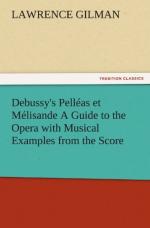Melisande and Pelleas meet in an apartment in the castle. Pelleas is about to leave, to travel, he tells her, now that his father is recovering; but before he goes he must see her alone—he must speak to her that night. He asks that she meet him in the park, at the “Fountain of the Blind.” It will be the last night, he says, and she will see him no more. Melisande consents to meet him, but she will not hear of his going away. “I shall see you always; I shall look upon you always,” she tells him. “You will look in vain,” says Pelleas; “I shall try to go very far away.” They separate. Arkel enters. He tells Melisande that he has pitied her since she came to the castle: “I observed you. You were listless—but with the strange, astray look of one who, in the sunlight, in a beautiful garden, awaits ever a great misfortune.—I cannot explain.—But I was sad to see you thus. Come here; why do you stay there mute and with downcast eyes?—I have kissed you but once hitherto, the day of your coming; and yet the old need sometimes to touch with their lips a woman’s forehead or the cheek of a child, that they may still keep their faith in the freshness of life and avert for a moment the menaces of death. Are you afraid of my old lips? How I have pitied you these months!” She tells him that she has not been unhappy. But perhaps, he says, she is of those who are unhappy without knowing it. Golaud enters, ferocious and distraught. He has blood on his forehead. It is nothing, he says—he has passed through a thicket of thorns. Melisande would wipe his brow. He repulses her fiercely. “I will not have you touch me, do you understand?” he cries. “I came to get my sword.” “It is here, on the prie-Dieu,” says Melisande, and she brings it to him. “Why do you tremble so?” he says to her. “I am not going to kill you.—You hope to see something in my eyes without my seeing anything in yours? Do you suppose I may know something?” He turns to Arkel. “Do you see those great eyes?—it is as if they gloried in their power.” “I see,” responds Arkel, “only a great innocence.” “A great innocence!” cries Golaud wildly. “They are more than innocent!... They are purer than the eyes of a lamb.—They might teach God lessons in innocence! A great innocence! Listen! I am so near them that I can feel the freshness of their lashes when they close—and yet I am less far from the great secrets of the other world than from the smallest secret of those eyes!—A great innocence?—More than innocence! One would say that the angels of heaven celebrated there an unceasing baptism. I know those eyes! I have seen them at their work! Close them! close them! or I shall close them forever!—You need not put your right hand to your throat so; I am saying a very simple thing—I have no concealed meaning. If I had, why should I not speak it? Ah!—do not attempt to flee!—Here!—Give me that hand!—Ah! your hands are too hot!—Away! the touch of your flesh disgusts me!—Here!—You




